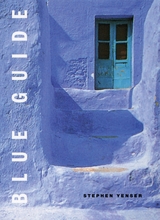
Inspired by the miraculously mercurial potential of words, Stephen Yenser takes readers on a heady trip through a world full of promise yet compromised by human weakness. Set in sunny southern California and Greece, the poems of Blue Guide cast the shadow of mortality, and the tones are elegiac. This combination of the deadly serious and the exuberant is natural, Yenser notes; after all, work and orgy share the same etymological root, as do travail and travel, pledge and play.
Using various poetic modes, Yenser offers here a quatrain written to name a painting by Dorothea Tanning; a sequence of poems for his daughter; an excursive poem at once about Los Angeles and Baghdad and his father and a petty criminal; a group of prose poems set in penumbral bars; some postcards to a dead friend; and a meditation prompted by a sojourn on a remote Aegean island. The most unexpected work is an assemblage of quotations and glosses in the tradition of the commonplace book, except that in Yenser's hands these entries are densely interrelated
.

A Boundless Field takes its title from Walt Whitman's sanguine view of the future of American poetry as he expressed it in "Democratic Vistas," a view that seems all the more pertinent today. During the later twentieth century, poetry in the United States branched out in many directions, ranging from a formalism influenced by New Criticism and a subsequent Neo-Formalism through the New York School and Language Poetry to a postmodern maximalism too diverse to categorize. The essays and reviews collected in this volume take up the work of poets writing in these different areas and writing into the twenty-first century.
Yenser's constant criteria for worthiness of attention include an alertness to the long tradition of English and American poetry, a consistent awareness of the integrity of the poetic line, a simultaneous commitment to verbal play and verbal work, and an implicit acknowledgment of two of Wallace Stevens's declarations: first that all admirable poetry is experimental poetry, and second that at first blush all good poems put up a certain resistance to the reader. Hence the usefulness of "criticism."
Stephen Yenser is Professor of English, University of California, Los Angeles. His poetry has appeared in many publications and to wide acclaim, including the Walt Whitman Award of the American Academy of Poets for his book The Fire in All Things. He is also author of The Consuming Myth: The Work of James Merrill and Circle to Circle: The Poetry of Robert Lowell.

James Merrill is now widely recognized as one of the essential poets of our time, one of those whose achievement will define postwar American literature. The Consuming Myth is a discerning account of his work that will well serve amateur and initiate alike. Stephen Yenser ranges over all of Merrill’s writing to date, from a precocious book printed when its author was fifteen to his most recent publication, a verse play. He writes about both of the poet’s novels and pays particular attention to the epic poem The Changing Light at Sandover. His close readings shed light on Merrill’s boldly and subtly original techniques, his kinship with Mallarmé, Proust, Yeats, Stevens, and others, and the network of connections among his diverse undertakings.
Yenser suggests that Merrill’s special power springs in part from transactions between evidently opposing perceptions. On the one hand—as the result of some poetic version of what physicists call “pair production”—whatever Merrill looks at hard yields its contraries. All about him, and within him too, he discovers duality and division. On the other hand, he is profoundly aware of the interconnectedness of things, whether they be his life and his art (which we might think of as aspects of his work), or humanity and nature, or good and evil. It is out of quarrels with ourselves that we make poetry, Yeats observed; and it is in striving to accommodate intuitions of both difference and identity that Merrill has fashioned his distinctive manner.
READERS
Browse our collection.
PUBLISHERS
See BiblioVault's publisher services.
STUDENT SERVICES
Files for college accessibility offices.
UChicago Accessibility Resources
home | accessibility | search | about | contact us
BiblioVault ® 2001 - 2024
The University of Chicago Press









